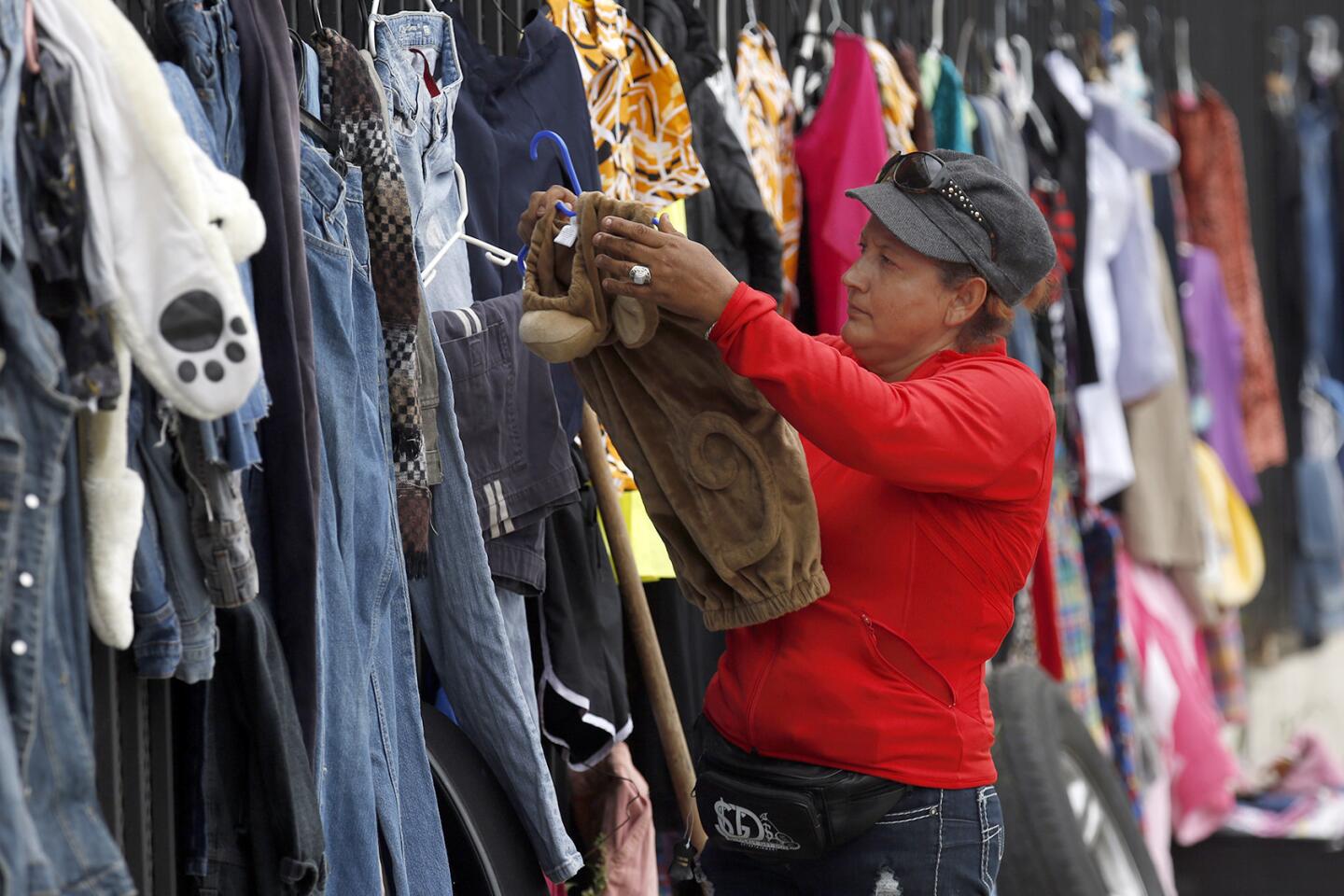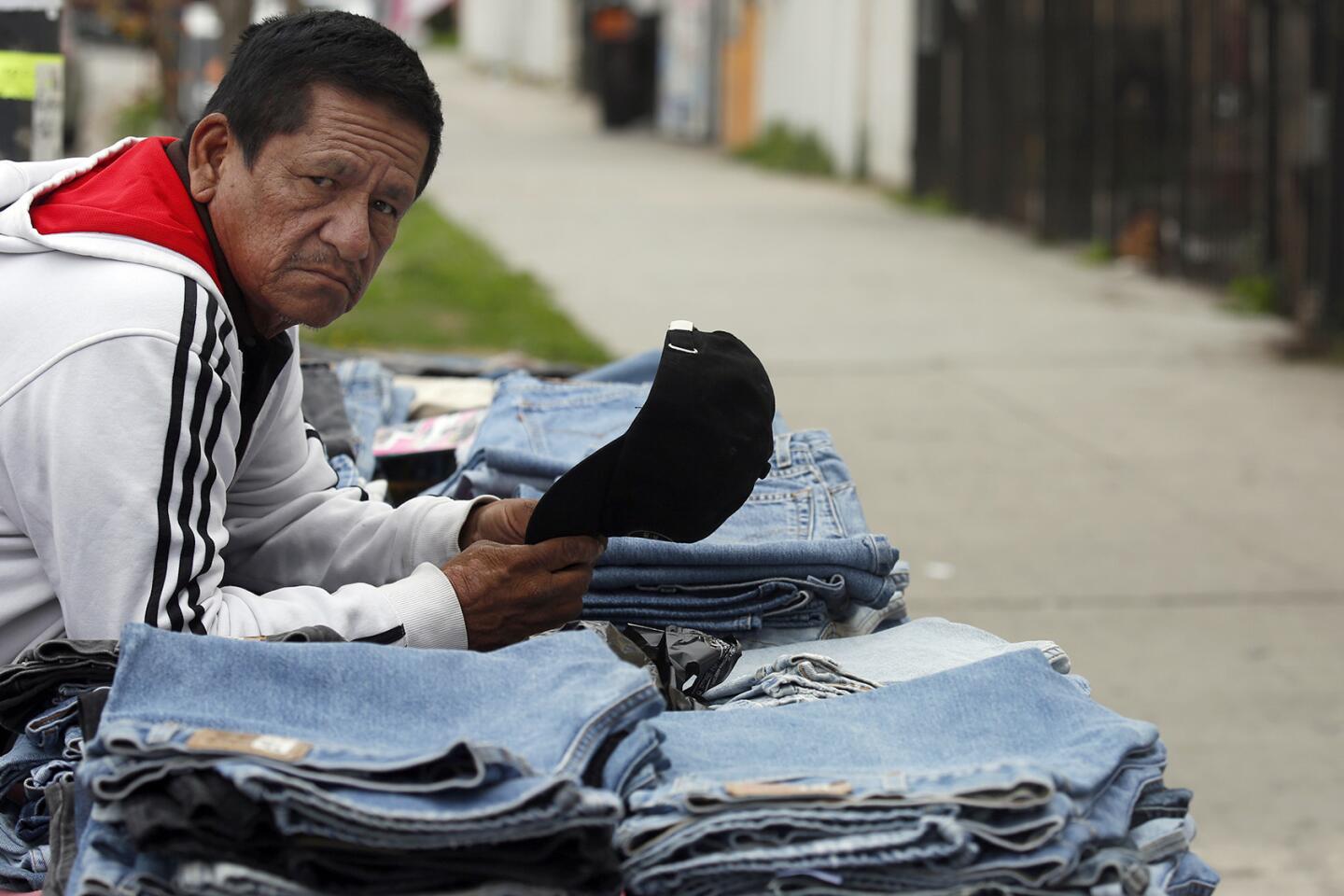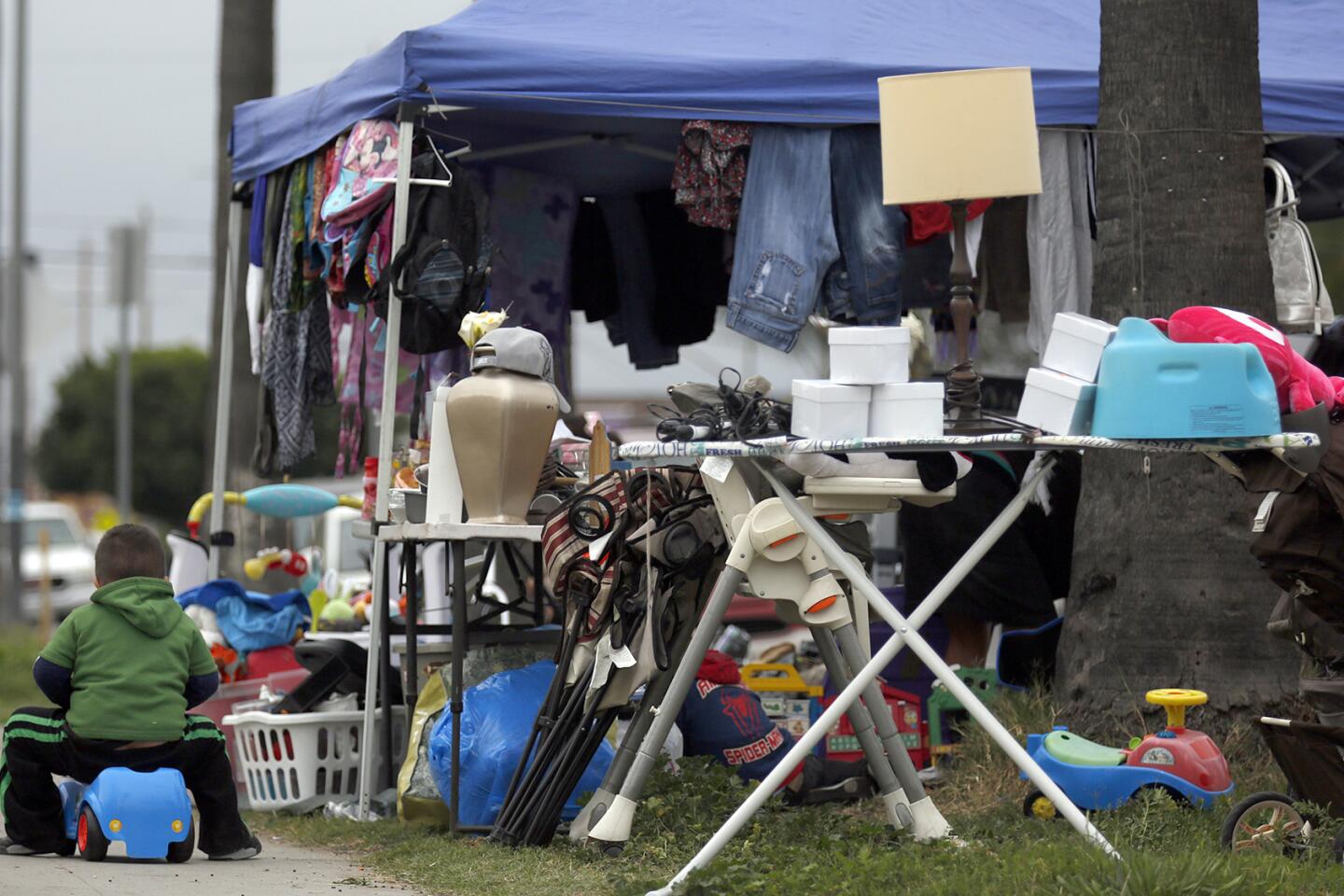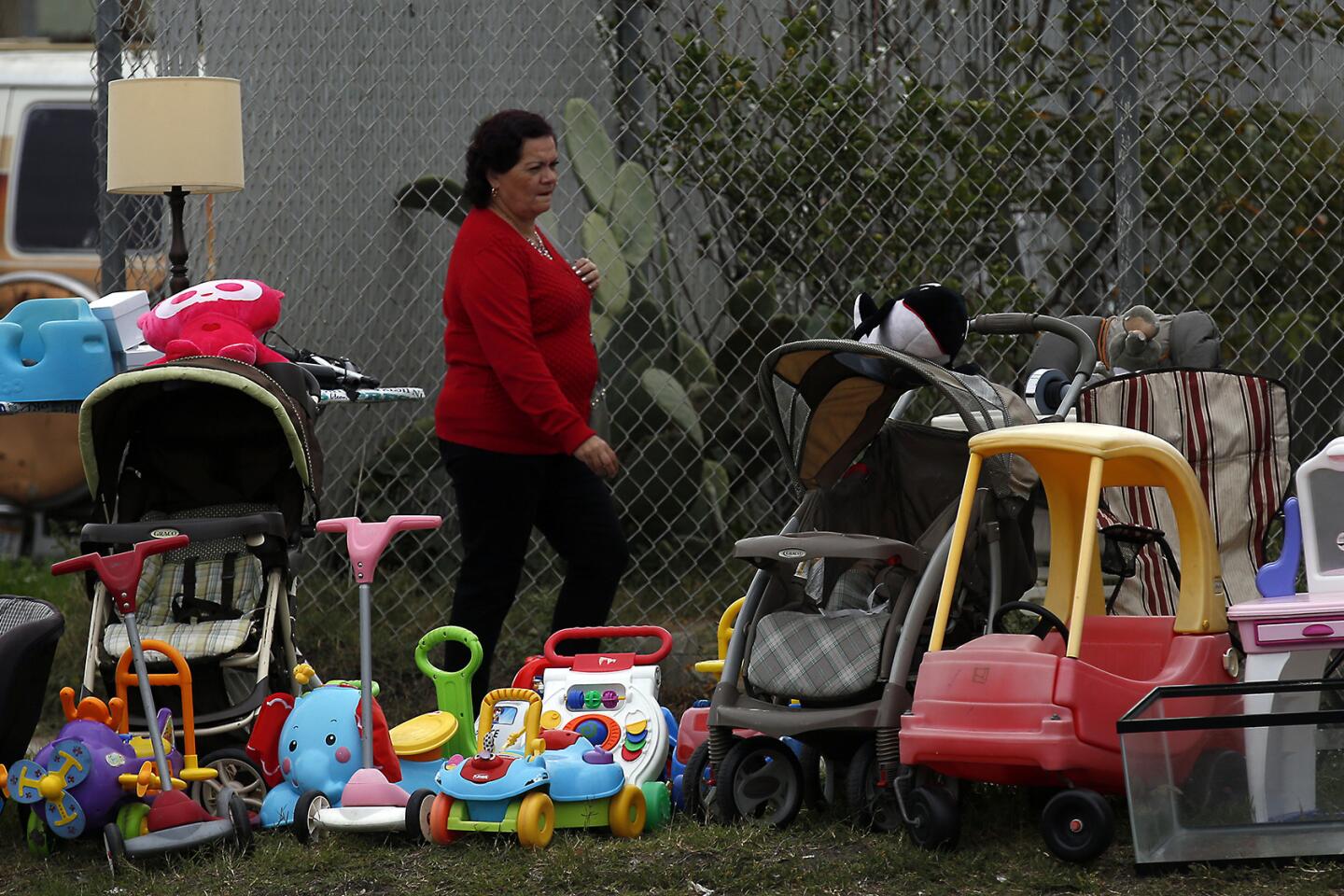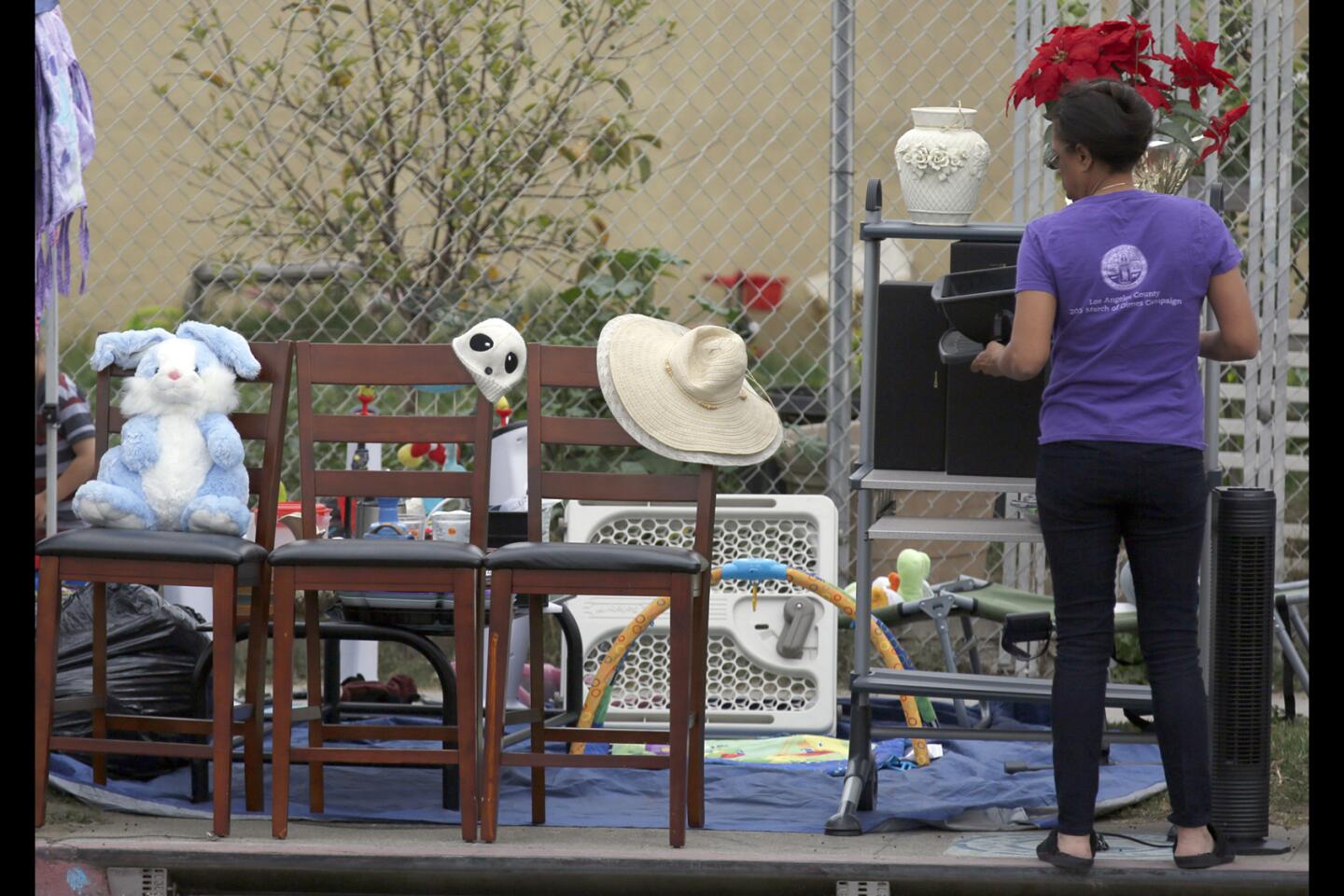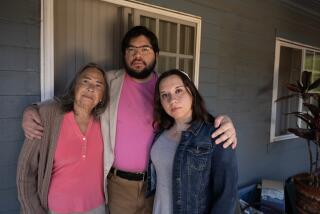Street vendors on Figueroa Street: An entrepreneurial spirit rises from the depths of poverty
- Share via
Claudia Flores and her husband were months past due on $60 phone and $80 electricity bills.
So they packed their minivans with strollers, car seats, used T-shirts and assorted other things and drove to a stretch of Figueroa Street just blocks from Imperial Highway in South Los Angeles.
There, they spread their wares on the sidewalk and opened for business.
This part of Figueroa Street has become a shopping bazaar of last resort for people living on the margins.
Each weekend, dozens come in battered pickups, vans and old compact cars filled with possessions hoping to raise money to pay down bills or supplement their low-wage jobs. A street away from the Floreses, a man sold a couch, dressers and shirts. Another sold jeans in front of a laundromat. A group of women sold dresses, blouses, baby toys and power tools.
“It would be more convenient for me to work a job than be out here doing this,” said Flores, 27, a Mexican immigrant in the country illegally waiting for a two-year work permit. “I make very little out here. Sometimes I don’t make anything at all.”
I make very little out here. Sometimes I don’t make anything at all.
— Claudia Flores, street vendor
Street vendors have long been a part of life in Los Angeles. They are the bacon-wrapped hot dog vendors outside the Sports Arena the night Bruce Springsteen closed out the place, the Mexican push-cart vendors selling ice cream and mayonnaise-slathered corn cobs on sticks in East L.A., or Chinese immigrants trying to sell homegrown vegetables to Chinese restaurants in the San Gabriel Valley.
But the scene on Figueroa and several other streets in South L.A. reflects a kind of street vending — the rooted-in-place sales of things instead of food — that often gets overlooked.
Vincent Moore, a pastor at Messiah Full Gospel Bible Fellowship at Figueroa and 90th streets, said he noticed people coming to sell things on the sidewalk about a year ago.
“What it generally costs to sustain life on a monthly basis, the majority of the people in this community don’t make it,” Moore said. “So they juggle and they do what we call hustling. But these people are hustling to maintain the norm or to get to some level of norm.”
He and others say it reflects the struggles of people at the very bottom of the margins to make ends meet at a time of rising rents. Over the years, he noticed that lines for food giveaways grew longer and the sale of used items grew near the church. Some sold their own property. Others served as middlemen for groups of families or clothing wholesalers. Food vendors showed up at night. Then he saw something he had never seen before: A black man selling food just like the mostly immigrant street vendors do.
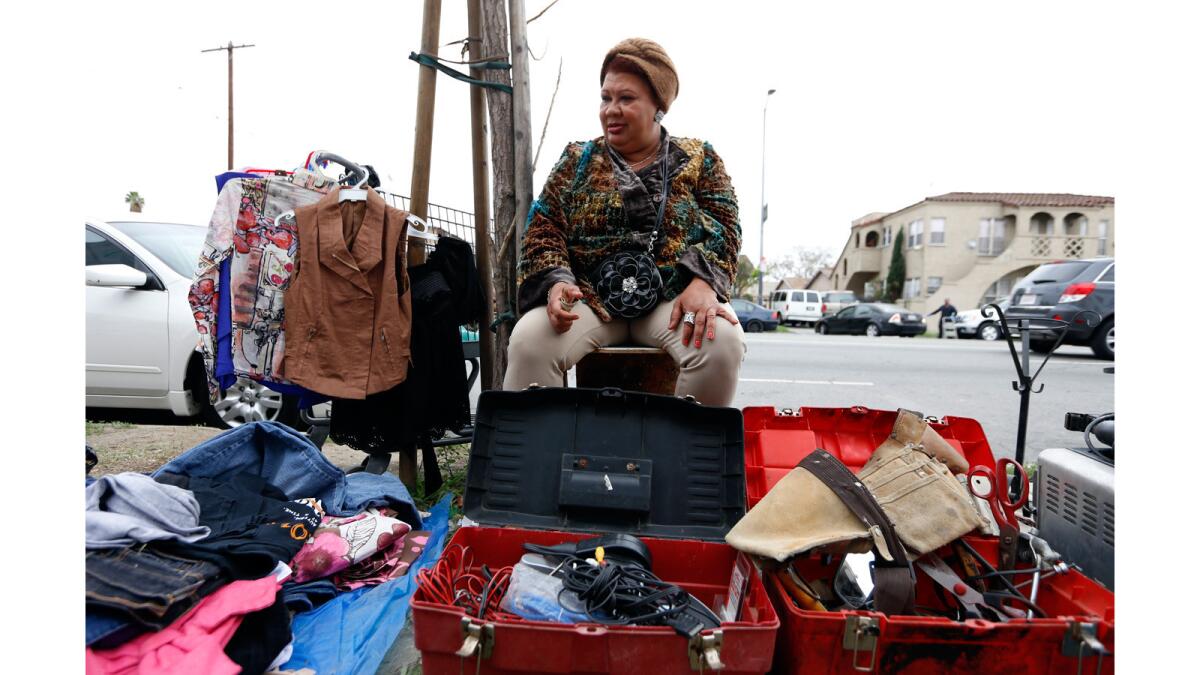
Julia Martinez, 52, who lost her job two months ago, sells clothes and other items on Figueroa Street in South Los Angeles.
“A lot of vendors are trying to make the money to survive in Los Angeles,” said Fernando Abarca, a community organizer with East Los Angeles Community Corp., a nonprofit that supports vendors. “Rents are going up, cost of living is going up as well, but the salaries aren’t going up. The opportunities aren’t there. Vending provides that outlet. They can be a small-business owner because that’s what they are.”
On Figueroa, the customers buying used items from vendors were mostly people looking for a deal in a neighborhood with not a lot of mainstream retail options. Some bought dressers, others coffee tables, used sneakers, curtains or plastic bins.
Griselda Clotter, 41, bought a child car seat from a woman for $10.
“I don’t plan on using this for a long time, so I don’t want to spend a lot of money for it,” Clotter said. “She wins and I win.”
At 75th Street and Figueroa, across from a fleet of parking enforcement vehicles, Rosendo Bernardino, 40, organized piles of rusted wrenches and hammers on a white tarp. Dollies stood in a neat row behind a green generator. On a table along the wall of the apartment complex where Bernardino lives with his wife and two sons, rows of power drills sat alongside rusty circular saw blades and pliers.
Bernardino set up just a street away from a business that sells used tools and makes keys, and from Maria Rio, 52, who was watching television inside her tiny stucco apartment. From her couch she kept an eye on the stacks of jeans she was selling. Shirts hung from a chain-link fence.
“This is not a grand business,” she said. “But it helps a little. It helps every weekend.”
Apartment buildings, single-story homes, motels and a few fast-food restaurants line this part of Figueroa. Prostitutes walk up and down the thoroughfare, going in and out of cheap motels.
“One time my kids were out here, and one girl was walking by and she was almost half-naked, man,” Bernardino said, shaking his head and chuckling.
In parts of Los Angeles, heavy concentrations of vendors have sparked complaints about congested sidewalks, and from local merchants who worry that the vendors’ sales are hurting their businesses.
Some critics say the city needs to do more to crackdown on street vendors.
“No one wants to subject people to further distress because they’re very low income but the laws have to apply to everybody,” said Carol Schatz president and chief executive officer of Central City Association, a business advocacy group. “Everyone has the right to make a living but not at the expense of small businesses or other vendors who are vending legally.”
But in South Los Angeles, there is also recognition that street vending is a necessity for some poor families. Councilman Marqueece Harris-Dawson, whose district includes this span of Figueroa, said the city needs to strike a balance between regulating street vending and recognizing that some people are getting by because of it.
See more of our top stories on Facebook >>
“Hopefully we can come up with something that both rewards the entrepreneurial ingenuity and innovation on the one hand, but also protects quality of life for the city’s residents and businesses,” he said.
On a recent weekend near Central and Slauson avenues, men dressed as clowns waited for the traffic light to turn red — their cue to run to the middle of the crosswalk and juggle green, yellow and red balls for tips. Down the street, a key maker operated from the trunk of his white Chrysler PT Cruiser.
Carlos Moreno, 62, has sold bluejeans out of his red Ford Aerostar van since he was laid off six years ago from his job as a custodian. In a good month, he said, he makes about $300 from selling on the street.
A block away, blouses, dresses, T-shirts and children’s clothes hung from a tall chain-link fence between 82nd and 83rd streets. Along the parkway, four women had laid out plumbing and power tools, used shoes, glassware, cribs and luggage bags over white and blue wrinkled tarps. There were ladders and strollers too. Most of the women said they started selling earlier in the year.
As she sat on a wooden crate, Julia Martinez, 52, said she needed to raise $60 she owed her landlord by selling items, including her own clothes. She rents a room for $400 a month. Martinez said she had worked caring for an elderly woman for $300 a week. But two months ago, the woman’s family decided to send her back to Mexico. She said she took up random jobs such as babysitting, cleaning and helping a friend with a rummage sale at another location.
Silvia Salazar, 52, said she sells once a week for the same reason everybody else on Figueroa does: “Pure necessity. You really don’t make a lot out here, but you know what, let’s say I make $30 today, that’s money for at least one bill.”
Whatever money she can squeeze from selling on the street goes to pay her $950-a-month rent, along with other bills. The police have not bothered them, the women say. But all say they have been robbed at least once.
Salazar said she tells her daughter to study hard so she doesn’t have to struggle like her mother and father.
“She got accepted to USC recently,” she said with pride. “She wants to be a fashion designer or study business administration.”
Twitter: @latvives
ALSO
Kobe Bryant’s finale is well done: 60 points and a Lakers win
Katy Perry wins a victory in battle to buy nuns’ convent in Los Feliz
As Clinton and Sanders prepare for debate, New York polls are very stable
More to Read
Sign up for Essential California
The most important California stories and recommendations in your inbox every morning.
You may occasionally receive promotional content from the Los Angeles Times.
